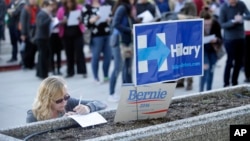Republican voters in Nevada headed to caucus sites statewide Tuesday to make their choices from a narrowing field of Republican presidential candidates. Turnout, expected to be low, could have a big impact on the race.
Billionaire Donald Trump headed into the caucuses with a lead in the latest polls following primary wins in New Hampshire and South Carolina. Trump had about 40 percent support, while his opponents, Senators Marco Rubio and Ted Cruz, were fighting for second place with about 20 percent. Ohio Governor John Kasich and retired surgeon Ben Carson were polling in the single digits and were not considered major challengers in this caucus.
Nevada is an unusual contest for a number of reasons. State caucusgoers are historically difficult to poll, since many live in rural areas outside the three main cities of Reno, Las Vegas and Henderson. This was also only the third time Republicans have held caucuses in the state, and the unfamiliar format could affect turnout. Only 1.9 percent of registered Republican voters turned up in 2012, the last presidential election year.
“People aren’t used to them like they are in Iowa, where it’s a long-running tradition,” said Kevin Banda, assistant professor of political science at the University of Nevada-Reno. He said campaigns have to expend effort educating voters on a potentially time-consuming and confusing process. Trump chose not to invest in a significant ground presence in the state — a decision that Banda said was likely to hurt more in a caucus state than in a standard primary.
All three lead contenders in the Republican field, however, have personal attributes that make them attractive to Nevada voters, said Matt Dallek, an assistant professor at George Washington University’s Graduate School of Political Management.
“The rural areas have large swaths of evangelical voters, which could favor Ted Cruz. Marco Rubio spent some time living in Nevada in his youth, so he has some ties to the state. Trump obviously has some ties to Las Vegas and the world of casinos,” Dallek said.
The establishment candidate
One-time favorite Jeb Bush dropped out of the race following a poor showing in the South Carolina primary, while Kasich and Carson have continued on. The diminished field of candidates potentially benefits Rubio, who received a number of party endorsements in the days leading up to the caucuses, including the backing of former Republican presidential candidate Bob Dole.
Nevada was seen as a significant test of Rubio’s ability to increase his poll numbers to rival Trump's. A gain of 6 to 8 percentage points “puts him within striking range of Trump’s 30, 33 percent of the vote that he’s been receiving,” Dallek said.
For Cruz, Nevada presented a way to reset the conversation after a difficult week in which he lost the evangelical vote to Trump in South Carolina and faced accusations that his campaign plays dirty tricks on his opponents. Cruz had to fire the public face of his campaign, communications manager Rick Tyler, for social media posts falsely alleging Rubio mocked the Bible.
Cruz doubled down on his approach to illegal immigration Monday when he said he would send federal agents to arrest undocumented immigrants.
“It’s an attempt to show that he is tougher than Trump and more willing to crack down,” Dallek said.
Nevada is a multiethnic state, but the historically low turnout of caucusgoers tends to skew heavily for white voters. Despite the predicted low turnout, Dallek said Tuesday’s results would have far-reaching implications if Trump ends up as the winner.
“The question becomes: Where can he be stopped? Where is he deprived of a victory — or multiple victories — and who will do the stopping?”
The next Republican presidential contest is the crucial Super Tuesday vote on March 1, when more than a dozen states hold primaries, awarding the bulk of delegates needed for the nomination.
